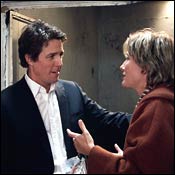
Love Actually is a paradox, actually: a highly engineered puffball. Its first-time director, Richard Curtis, is a show-business phenomenon in England. With TV and film writing credits that include Blackadder, Mr. Bean, Four Weddings and a Funeral, Notting Hill, and Bridget Jones’s Diary, he’s clearly a dominant force in British comedy. In the movie realm, at least, that’s a mixed blessing. Too often what he gives us, along with wiggy, literate barbs, are feel-good jamborees dripping with treacle and uplift. Love Actually—which follows a flurry of romantic entanglements set mostly in London in the five weeks leading up to Christmas—is a megadose of everything good and bad about Curtis. It has moments, sequences even, that are roisterously funny in the best antic, high-low tradition of British comedy. The film’s surplus of saccharine, however, will probably give pause to theater owners. After all, why would anyone watching this movie bother going to the concession stand for sweets?
Curtis crams so many disparate love stories into Love Actually that at times it feels like a medley of ten different movies. (The amorous pairings are pretty mainstream, though—no gay couples or old couples, for example.) The stories share the theme of love’s abiding power to lift the spirits. When darkness intrudes, as in the scenes involving Emma Thompson and Alan Rickman as a couple on the rocks, you can be sure that the sun will come out. Still, these are the best performances in the movie, perhaps because something resembling realism resides in the situation.
“Love Actually has moments that are roisterously funny—but its surplus of saccharine may give pause.”
This is not so in the scenes featuring Hugh Grant as the bachelor prime minister who fancies his young assistant, played by Monica Lewinsky look-alike Martine McCutcheon. (Grant, however, could probably outpoll Tony Blair in the next election.) Better are the sequences with Bill Nighy as an aging, strung-out rock star whose rendition of a Christmas version of “Love Is All Around” brings him reluctantly back into the limelight. Nighy knows how to be cheeky and lewd—indispensable tools in any British comic’s kit. I could have used more of him and less of the other stories, especially the one with Colin Firth as a jilted novelist who falls for his Portuguese housekeeper (Lúcia Moniz). For a long time, their love remains unspoken because—imagine!—they don’t speak each other’s language. Cloying as much of this stuff is, it’s not cynical. Curtis seems genuinely convinced that love is all around. Far be it from me to say otherwise. We don’t speak the same language.
On the other hand, Jon Favreau’s Elf, which is also set close to Christmastime, makes Love Actually seem hardbitten by comparison. (Am I missing something? Didn’t Christmas movies used to come out around Christmas?) Will Ferrell plays Buddy, a foundling raised as an elf in Santa’s North Pole who journeys to New York to find his true father (James Caan) and ends up working at Gimbel’s department store, where his hyperactive Christmas spirit sets him apart from the holiday drones. I was looking forward to something a tad more satirical than this Hallmark card of a movie, which plugs innocence and goodness like they’re going out of style. If this week’s movies are any indication, they’re all the rage. Normally I love watching Ferrell do his gangly, clueless shtick, and even here, there’s something inherently funny about just seeing him in a big, green elf suit. There’s something inherently funny about Ferrell—period. (My press notes point out that he graduated USC with a degree in “sports information.”) But it’s awfully early in his movie career to be playing cuddly family-entertainment darlings. I thought he had it right in his last film, Old School, where he got blotto at a kegger and then streaked down Main Street in blissful oblivion.